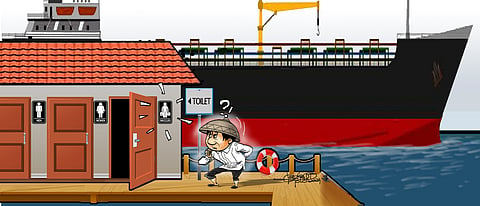
- NEWS
- the EDIT
- COMMENTARY
- BUSINESS
- LIFE
- SHOW
- ACTION
- GLOBAL GOALS
- SNAPS
- DYARYO TIRADA
- MORE

It took a devastating typhoon to make the nation refocus its attention on oil smuggling, which has been costing the economy about P45 billion a year in terms of the outright evasion of taxes and misdeclaration based on Asian Development Bank (ADB) estimates.
The government initiated in 2019 a fuel marking program that produced good results, but the recent incident on Manila Bay indicated that syndicates had found a way to skirt the government program.
That smuggling syndicates are lording it over the fuel industry despite the government program can be deduced from the wide disparity in fuel prices, particularly outside Metro Manila.
Justice Secretary Jesus Remulla said the government is on the trail of a Batangas-based syndicate that has cornered the black market for pilfered petroleum products through the so-called “paihi” racket.
Remulla said a full appreciation of the activities of the oil smuggling syndicates points to hundreds of millions of pesos in lost revenue to the government.
Under the smuggling scheme, fuel from huge tankers is siphoned off to smaller vessels that distribute the product, thus avoiding the payment of taxes and Customs duties.
Remulla said that “bulk suppliers of oil” are included in the Department of Justice (DoJ) probe for their possible complicity in the scheme.
The government had engaged SGS Philippines Inc. and Switzerland-based SICPA SA to manufacture the additive for the fuel marking program but the contract was more on injecting the chemicals as a color guide. The contractors were required to mark 119-billion liters of fuel.
Government sources said the fuel marking program became less effective after the Bureau of Internal Revenue (BIR) issued a directive in July 2022 terminating the field-testing component of the program.
The BIR memorandum effectively overrode a Department of Finance circular that required joint inspections with Bureau of Customs agents of the random field and confirmatory testing on fuel products.
A robust fuel marking program was credited by the ADB for a comprehensive approach that analyzed each stage of the supply chain beginning with the country’s refineries or fuel depots, and extending to the eventual sale of fuel products at the retail level.
Insiders said the BIR withdrawal from the field inspections rendered the fuel marking program ineffective since the government couldn’t be sure about petroleum products having the official mark.
It also virtually invited more smuggling of oil products since the inspections were essential to the program.
Remulla said the oil syndicate based in Batangas has a huge network that can hunt down individuals who oppose them.
On 25 July, the MT Terranova capsized off Limay, Bataan at the height of typhoon Carina, killing one crew member. On 27 July, the MT Jason Bradley sank in the waters off Mariveles, also in Bataan, while the MV Mirola 1 ran aground near the coast of Mariveles town around the time of the heavy downpour.
According to Remulla, the incidents opened another “Pandora’s box” in the Philippines that was “silently tolerated for the longest time.”
The owner of the Terranova denied allegations it was involved in oil smuggling. The cargo of industrial oil it was carrying was owned by a conglomerate that also owned the fuel oil that leaked in last year’s Mindoro oil spill.
A more comprehensive program comparable to fuel marking
